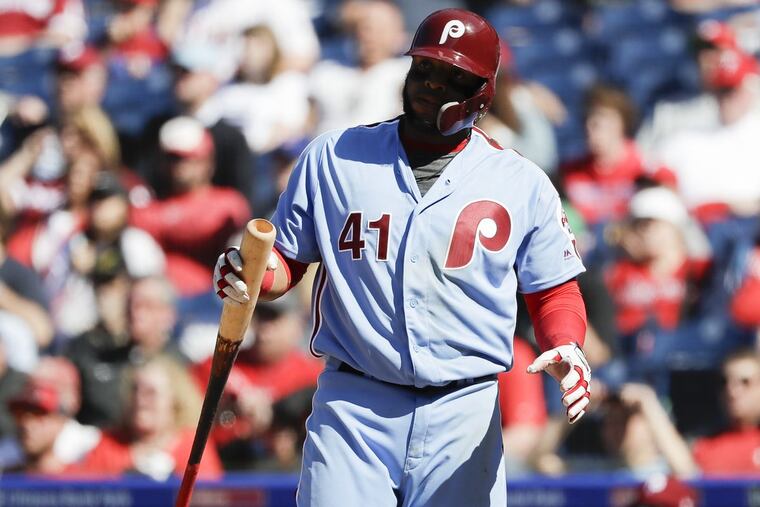Carlos Santana on poor start with Phillies: 'Check back in September'
The first baseman has gotten off to a dreadful start with the Phillies after signing a big free-agent contract.

Carlos Santana knows the numbers. How could he miss them? They're plastered all over every scoreboard in every ballpark where he steps to the plate. And they're ugly. Hideous, actually.
Santana would love to tell you the numbers don't represent the player he has been throughout his nine years in the big leagues. But he can't do that. Not when he has hit 28 points lower before the all-star break than after it. And not with a .771 OPS in the first half of those seasons compared with .845 in the second half.
So, Santana does the next best thing. He appeals to hard-to-please Phillies fans for their patience, knowing full well he hasn't earned it. It has been only five months since he signed a three-year, $60 million contract, the fourth-largest free-agent deal last offseason. And if you have one hit in your last 22 at-bats and are batting .151 with nine extra-base hits in 132 plate appearances overall, good will is in short supply.
But manager Gabe Kapler and other Phillies officials keep pointing to Santana's 22 walks in 30 games, hard-luck .163 batting average on balls in play, and more than anything, his career track record as reasons to have faith in him.
To Santana, the last one is the sturdiest thing he has to lean on.
"I know I've struggled this month, but this is not new for me," Santana said. "My numbers, I finish strong. Check back in September."
Indeed, if the season lasted three months, Santana might be out of baseball. In a career spent mostly with the Cleveland Indians, he has batted .227 with 195 extra-base hits in 1,996 at-bats through the end of June. But from July through seasons' end, he is a .265 hitter with 237 extra-base hits in 2,104 at-bats.
That's why Santana has never been an all-star but was nevertheless in demand as a free agent early in a historically slow-developing offseason.
"We couldn't be more confident in Carlos," Kapler said. "He's a performer. He's going to perform. He's going to drive in runs for us."
Santana has racked his brain to explain his slow starts. At a loss, he repeats advice he has received over the years from older players.
"It's a long year," Santana said. "I try to figure out how to be consistent for the six months, but it [never] happens. I've played with some top players, and this is what I've learned: Focus on playing every day and finish strong. First month, you're struggling. But you have five more months to fight."
It's a mature outlook for a player who wasn't always known for his maturity.
Santana came to the majors in 2010, at age 24, as a switch-hitting catcher. In 2014, the Indians moved him to third base, an experiment that didn't go well. He became a first baseman, but was challenged by manager Terry Francona to work harder at the position. Two years ago, when the Indians went to the World Series, Santana was primarily a designated hitter.
The Indians tried Santana in nearly every spot in the batting order, too. Sometimes, they asked him to be a middle-of-the-order run producer. Others, they sought to take advantage of his keen eye near the top of the lineup. Francona even batted Santana leadoff last year.
Through it all, Santana became more receptive to change. His relationship with Francona evolved, too. He even developed a pregame ritual in which he would plant a kiss on the manager's head.
"Rarely, at least in my time, do you see guys change in the middle of their career," Francona said last winter. "He could get kind of surly at times and get a little consumed with how he's doing. And about the halfway mark of the last couple years, he's a better teammate, better person. He's hard not to like, lovable."
Santana says he appreciated Francona's positivity, a trait he sees in Kapler. Under Francona, Santana made himself into a better first baseman, even earning a Gold Glove nomination last year.
The Phillies were drawn to Santana in part because of his leadership. Before spring training, he took it upon himself to visit the team's academy in the Dominican Republic. Last week, when young shortstop J.P. Crawford went on the disabled list with a strained forearm and a .188 batting average, he received a pep talk from Santana.
"This is me," Santana said. "I don't know if they see me as a leader, but for me, I talk to you from my heart."
Said third baseman Maikel Franco: "It's been a blessing having him here. You just watch what he does and try to do the same thing."
Eventually, though, Santana knows he must produce. Patience and a positive attitude go only so far.
"When the team needs me," Santana said, "I'll be there."